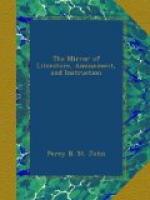“On the 19th of May, we were with their Majesties from six to ten o’clock in the evening. No one was present but the two princes, brothers to the king and queen. The king placed before Wolfgang not only pieces of Wagenseil, but of Bach, Abel, and Handel, all of which he performed prima vista. He played upon the king’s organ in such a style that every one admired his organ even more than his harpsichord performance. He then accompanied the queen, who sang an air, and afterwards a flute-player in a solo. At last they gave him the bass part of one of Handel’s airs, to which he composed so beautifal a melody that all present were lost in astonishment. In a word, what he knew in Salzburg was a mere shadow of his present knowledge; his invention and fancy gain strength every day.”
“A concert was lately given at Ranelagh for the benefit of a newly erected Lying-in-Hospital. I allowed Wolfgang to play a concerto on the organ at it. Observe—this is the way to get the love of these people.”
A large portion of Leopold Mozart’s letters is occupied with masses to be offered up for the health, &c.; and during his sojourn in the Five-fields, Chelsea, he appears to have been in considerable hope that he had converted a Mr. Sipruntini (a Dutch Jew, and a fine violoncello player), to Catholicism. After dedicating a set of sonatas to the queen, and experiencing great patronage from the nobility, Mozart, with his father and sister, in July, 1765, crossed over into the Netherlands. At the Hague, a fever attacked both children, and had nearly cost the daughter her life. On their recovery, they played before the Prince of Orange, and Wolfgang composed some variations on a national air, which was, just then, sung, piped, and whistled throughout the streets of Holland. The organist of the cathedral in Haerlem waited upon the Mozarts, and invited the son to try his instrument, which he did the next morning. Mozart senior describes the organ as a magnificent one, of sixty-eight stops, and built wholly of metal, “as wood would not endure the dampness of the Dutch atmosphere.” Upon the return of the family to Salzburg, Mozart enjoyed a year of quiet and uninterrupted study in the higher walks of composition. Besides applying to the old masters, he was indefatigable in perusing the works of Emanuel Bach, Hasse, Handel, and Eberlin, and by the diligent performance of these authors, he acquired extraordinary brilliancy and power in the left hand. On the 11th of September, 1767, the whole family proceeded on their way to Vienna; but as the small pox was raging there, they went to Ollmuetz instead, where both the children caught that disorder. At Vienna, Mozart wrote his first opera, by desire of the emperor. Though the singers extolled their parts to the skies, in presence of Leopold Mozart, they formed in secret a cabal against the work, and it was never performed. The Italian singers and composers who were established in this capital did




